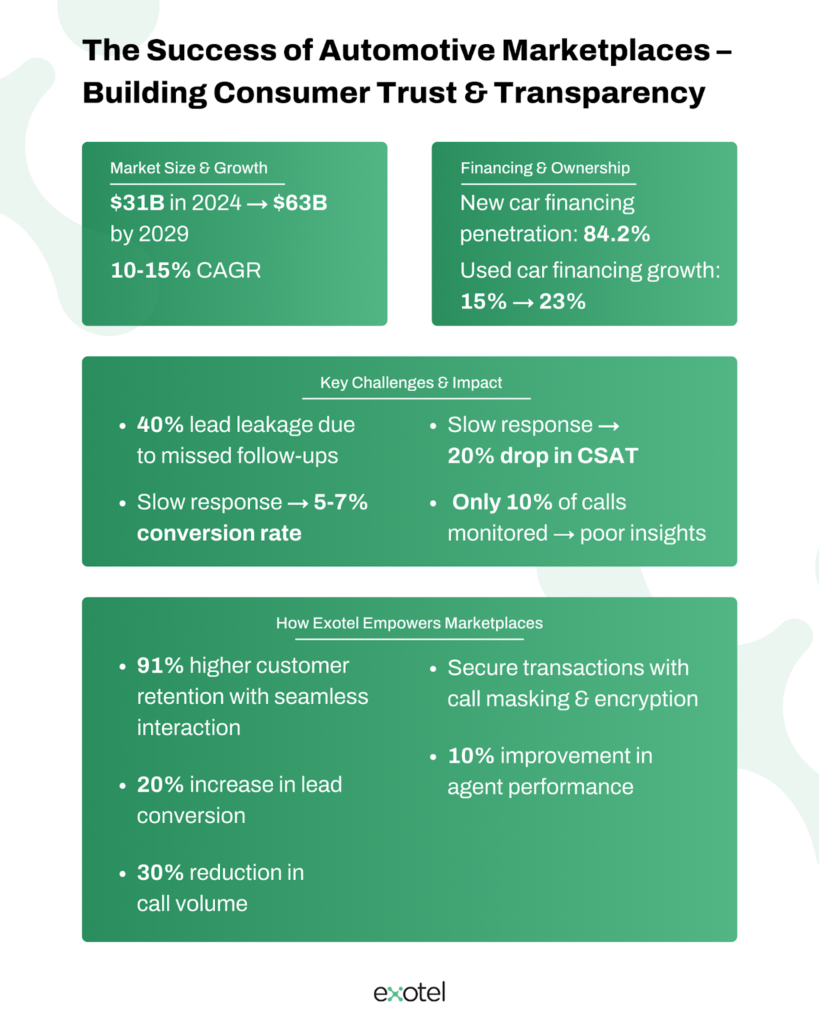The automotive marketplace in India is witnessing rapid growth, particularly in the used car segment. Estimated at $31 billion in 2024, the market is projected to reach $63 billion by 2029, growing at a 10-15% CAGR. Platforms like Cars24, Spinny, CarDekho, CarWale, OLX, ZigWheels, Car&Bike, Quikr, Droom, and CarTrade have revolutionized how consumers buy and sell vehicles. However, this transformation presents challenges in consumer trust, operational efficiency, and customer experience.
Factors Driving Growth in Automotive Marketplaces
Changing Consumer Preferences
- Increased trust in used cars due to improved quality, warranties, and platform reliability.
- Shift toward personal mobility post-pandemic, reducing reliance on shared transport.
- The average holding time of a new car has dropped from 5 to 6 years to 3 years.
- The new-to-used car sales ratio has grown from 1:1.2 to 1:2.2, reflecting higher used car demand.
Economic Factors
- The expanding middle class with rising disposable income is boosting vehicle ownership.
- Easier financing options have made used cars more accessible. New car financing penetration stands at 84.2%, while used car financing has grown from 15% to 23%.
Technology-Driven Transparency
- Buyers extensively research online before making a purchase decision.
- Digital platforms provide verified listings, virtual inspections, and secure transactions.
- Trust-building mechanisms, including vehicle certification, warranties, and customer reviews, enhance credibility.
Improved Ownership Experience
- Streamlined processes for documentation and registration make ownership hassle-free.
- Enhanced customer support systems and flexible financing options improve the buyer journey.
Challenges in Automotive Marketplaces
Despite significant growth, automotive marketplaces face key challenges that impact consumer trust, operational efficiency, and customer experience.
1. Marketing & Demand Aggregation
Problem:
Fragmented lead tracking across multiple channels leads to inefficient communication and lost opportunities.
Impact:
- Disjointed interactions result in repetitive communication and frustrated customers.
- No unified view of customer interest, making personalization difficult.
- Missed follow-ups cause up to 40% of lead leakage.
2. Sales & Conversions
Problem:
Poor lead allocation and manual processes slow down conversion rates.
Impact:
- Untracked leads delay responses, lowering conversions (industry average: 5-7%).
- Inefficient routing causes multiple handovers, frustrating buyers.
- Delayed financing approvals lead to abandoned purchases.
3. Customer Support & Satisfaction (CSAT)
Problem:
High call volumes and slow response times impact post-sale customer satisfaction.
Impact:
- Overwhelmed support teams cause long wait times.
- Limited real-time feedback reduces service quality.
- Poor issue resolution leads to a 20% drop in CSAT scores.
4. Data Privacy & Security
Problem:
Automotive marketplaces handle sensitive customer data, making privacy compliance crucial.
Impact:
- Unauthorized data sharing damages reputation.
- Repeated dealer calls create a negative customer experience.
- Compliance with regulations like DPDP and GDPR is complex and essential.
5. Manual Call Monitoring
Problem:
Monitoring calls manually is inefficient and offers limited insights into customer sentiment.
Impact:
- Only 10% of calls are typically monitored, leading to service inconsistencies.
- Lack of real-time insights hinders agent performance improvement.
How Exotel Empowers Automotive Marketplaces
Exotel’s solutions are designed to address the unique needs of car marketplaces, ensuring they can scale efficiently while maintaining superior customer experiences:
Exotel has been at the forefront of providing robust and unified communication solutions to digital-native businesses, including e-commerce platforms. With strong playbooks and case references, Exotel enables platforms to drive higher sales, conversions, and CSAT while reducing costs. Key solutions include:
- Omnichannel Communication Platform: Consolidates all customer interactions – calls, WhatsApp, SMS, emails, and chat – into a unified dashboard. This enables personalized and consistent communication, reducing customer frustration and improving response times. Companies using omnichannel strategies achieve up to a 91% greater year-over-year customer retention rate compared to those that don’t. (Source: Aberdeen Group)
- Automated Lead Management: Automates lead capture, qualification, and routing based on pre-defined rules, ensuring timely follow-ups and efficient allocation to the right sales agents. This can lead to a 20% increase in lead conversion rates. (Source: LeadSquared)
- AI-Powered Conversational Tools: Deploy AI-powered voice bots and chatbots to handle routine inquiries, provide instant support, and qualify leads 24/7. This frees up human agents to focus on more complex issues and can lead to a 30% reduction in call volume. (Source: Gartner)
- Data Privacy and Compliance: It offers features like call masking and data encryption to protect sensitive customer information and ensure compliance with regulations like the DPDP Bill. This builds trust and mitigates legal risks.
- Scalable Solutions: Provides a flexible, cloud-based infrastructure that can easily scale to accommodate growing business needs and handle peak call volumes without compromising performance.
- Enhanced Agent Productivity with GenAI: Leverages Generative AI to provide real-time insights into customer sentiment and agent performance through features like live call transcription, sentiment analysis, and automated call summaries. This enables data-driven coaching and continuous improvement of customer interactions. Companies using AI for quality monitoring see a 10% improvement in agent performance. (Source: McKinsey)

Conclusion
The Indian automotive marketplace is on an upward trajectory, driven by evolving consumer behaviour and technology adoption. To sustain this growth, platforms must enhance consumer trust, optimize operations, and improve customer engagement. Exotel’s advanced solutions equip automotive marketplaces with the tools needed to navigate these challenges and drive sustainable success in an increasingly competitive landscape.
 +91-808 8919 888
+91-808 8919 888 +91-808 8919 888
+91-808 8919 888 +966 135 181 912
+966 135 181 912



